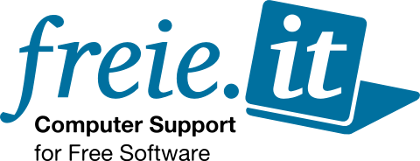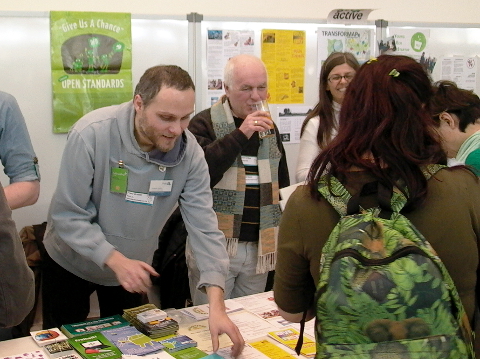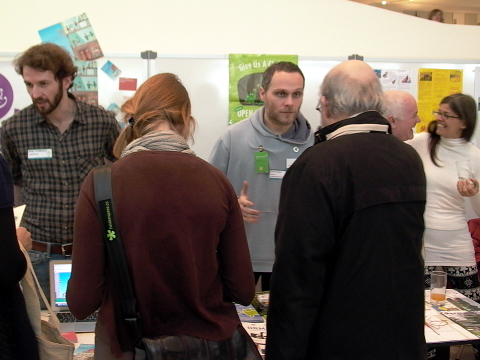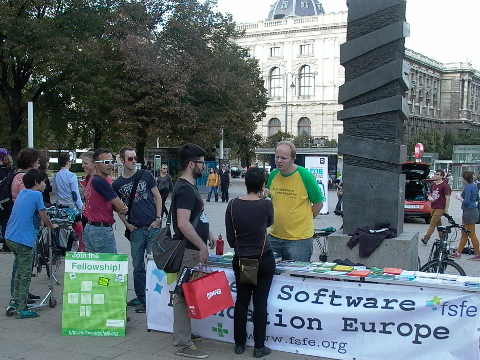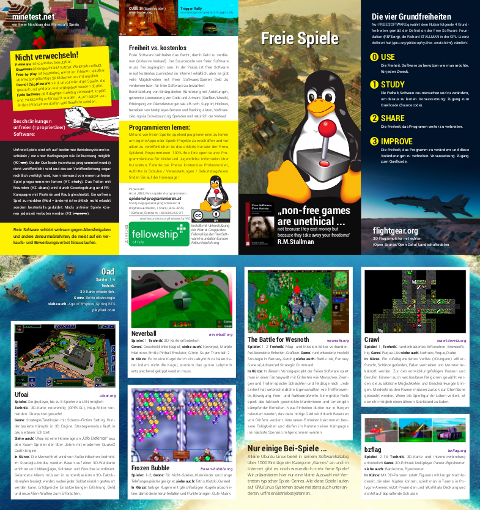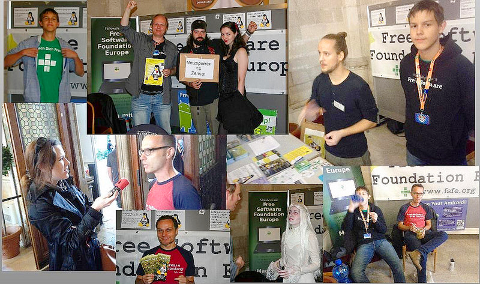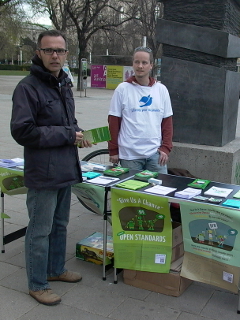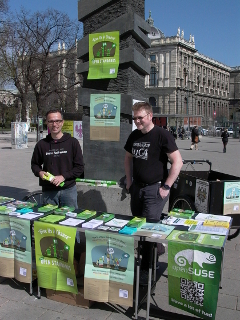FSFE supporters Vienna
Reports from the FSFE supporters group in Vienna
FSFE Fellowship and freie.it at Veganmania in Vienna 2015
June 11th, 2015
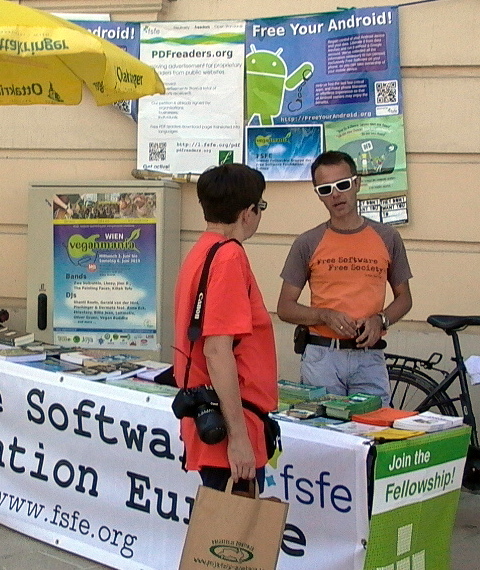
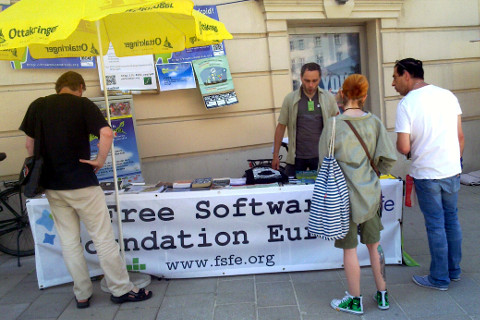

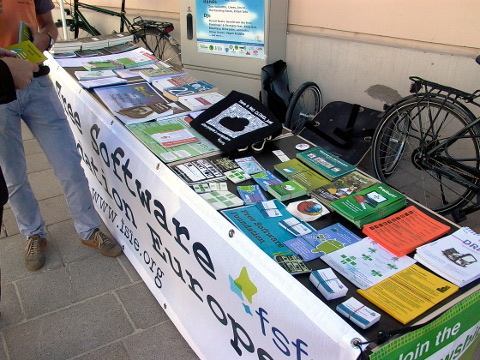
This year’s vegan summer festival in Vienna once more was bigger than ever before. It not only lasted four days but it doubled in size also. Last year 35 exhibitors where present. From Wednesday 3rd to Saturday 6th of June 2015 no less than 70 organisations and companies had set up their stalls in front of the Museumsquartier (MQ), opposite the famous museums of art history and natural history.
But not only the festival itself has got bigger, our already tratitional information stand was also larger. We were given more space and could therefore offer about four meters of tightly packed information material for a total of 50 hours (excluding breaks). Unfortunately, beside me, only Gregor was available from our Fellows to man the stall. He came on Wednesday and Thursday. Luckily this didn’t cause serious problems since we encountered unexpected help from other people later on.
Martin has been using Free Software for quite a while and visited our stalls on different occasions over the years. So I knew that he is very knowledgable about the issues we usually speak to people about. When I asked him for help he instantly shifted his time table and jumped in when I needed to rush into the Radio Orange studio for a live show about the festival itself. Not all people feel comfortable doing the technical side of live radio shows. Even if they are very easy, which is true in this case.
Radio Orange is an interesting subject in its own right. Austria was quite late with liberating the radio licenses. One of the first free radios was Radio Orange (o94) and it is set up completely with Free Software. I am constantly amazed how well this is done. Hundreds of very different people are using its setup on a regular basis. Some are more frequent than others. Some are very computer savy. Others avoid computers altogether. But the obviously very skilled technicans, who built and administrate the radio’s setup, manage to give all these very different people a good experience. I’ve been helping with two shows for quite a time now and everything runs 24/7. People doing their own shows, just enter the live studio, and start talking at the right time. It’s as easy as that. Pre-recorded shows are done similarly effortlessly. It’s possible to upload shows beforehand and they get aired at the right time automatically. Heck, there is even an automatic replacement if someone doesn’t show up or forgot to upload anything. I don’t know any other example of a complicated system with such a wide range of user types running this smoothly. Of course I have encountered glitches from time to time, but they where small and dealt with fast. This is an impressive example how powerful and reliable Free Software can be.
Back to the festival: Martin did a great job manning the stall while I was away for the radio show. When I was back he even stayed longer to support the stall. Many friends of mine visited me on the stall, but there wasn’t much chance to talk to me. I was involved in interesting, engaging conversations about Free Software with normal visitors of our stall virtullay the whole time. So often my friends didn’t even get the chance to talk to me and went away after a while of waiting for me to become available again. Even when more than one person was manning our information desk sometimes people didn’t get the chance to talk to us because there was more demand than we could meet.
On Friday René from Frankfurt, Germany showed up. Originally he had just made the journey to visit the Veganmania festival. He had his luggage with him and got stuck at our desk. In the beginning he just was a normal visitor but after a while he stepped in because there where so many people who wanted to ask questions and he obviously could answer them. In the end he helped with manning our desk until Saturday night. Happy with his competent help, I invited him to stay at my place and we had a great time discussing Free Software ideas until late in the night. So we didn’t get much sleep because we set up the stall about 9:30am each day and stayed there until 10pm. Unfortunately, we got on so well that he missed his train on Sunday. Therefore he had to endure an unpleasant train ride back home without the possibility to sleep.
I appreciate the unexpected help of Martin and René and hope they will stick around. Both ensured me they loved the experience and they want to do it in future again.
As usual, many people got lured to our desk because of the Free Your Android poster. Others just dropped by in order to find out what this all was about since they didn’t expect our subject on a vegan summer festival. But of course it was easy to explain how activism and Free Software relate to each other. In the end we ran out of several leaflets and stickers. In the hot weather we didn’t manage to sell the last of our Fellowship hoodies, but we sold some “there is no cloud …” bags and also received a donation.
The information desk marathon left us with a considerably smaller leaflet stack, brown skin like after two weeks of holidays and many great memories from discussions with very different people. The Veganmania summer festivals in Vienna are clearly worth the effort. We even got explicitly invited to join the vegan summer festival in Graz in September since the organising people figured they wanted to have someone informing about Free Software there also. I guess it is not necessary for us to travel to Graz since I’m told there are dedicated Free Software advocates there too.
Open letter to everymothercounts.org: Apple advertisement
March 28th, 2015
Dear every mother counts team,
Thank you for your work concerning health care for mothers. You have taken on an important and demanding challenge.
Please consider my following concern regarding Christy Turlington’s Apple advertisement:
I can understand why a marketing contract with Apple must look tempting. The deal might bring in a considerable amount of money. This can potentially fund urgently needed projects. But Christy Turlington’s prominent involvement in the promotion of Apple’s iWatch unfortunately still might counteract important aspects of your work.
Most mothers with insufficient access to health care probably only lack the necessary funds for getting it. Proper education would open a lot of doors in that regard. Modern education heavily depends on technology. Therefore Access to affordable technology and knowledge about it is of paramount importance.
Unfortunately open access is a foreign concept to Apple and it locks down everything it offers. Everything they develop is only made available to paying customers. Nothing is shared freely. They work with aggressive logical patents, closed standards and massive legal restrictions. Therefore, others are actively hindered in offering similar services or products under fairer conditions. [1]
Only freely available, well documented technology without restrictions gives everyone opportunities. Countless people around the globe discover, use, analyse, adapt and spread free software every day, regardless of whether they want to dig a well or organise their local resources more efficiently. If technology has no restrictions built in and comes without legal limitations attached to it, it ceases to be an instrument of power. Privileges are a given and don’t need to be sold or restrained. Apple itself has made heavy use of free software to built its own operating system. But unlike others, who not only took but contributed something, Apple decided to use the free software stack and then lock up what they had derived from it. This surely isn’t in line with everymothercounts.org’s philosophy.
Free software is an ethical approach to technology, fostering sharing and caring. It has inspired many other movements. It’s main concerns are independence and empowerment. So if you feel like teaming up with institutions in the field of technology, please consider ethically and socially aware players like Mozilla or even organisations like the Free Software Foundation!
My second concern about this marketing arrangement is privacy. Of course Apple promises everything the public wants to hear, but as long as it doesn’t give full public access to what is going on in its products, those are just nice words. Not even governments are allowed to check if Apple’s claims are met in reality. Of course this isn’t an Apple-only problem, but considering the unprecedented scope of data collection by the iWatch, this is a whole new dimension of surveillance acted out by a private, uncontrolled entity.
Free software on the other hand, is trustworthy because one of its merits is its open source. What it does is completely transparent and it can be audited by anyone who is interested. Even if you find features you don’t like, you are free to adapt, remove or just disable them. If someone has an idea how to improve on existing free software, that’s great, because it’s meant to be adapted and shared freely.
Please apply your principles in a wider context!
All the best for your work,
Franz Gratzer
fellow of the Free Software Foundation Europe (FSFE)
and an animal rights activist
[1] fsf.org/news/free-software-foundation-statement-on-the-new-iphone-apple-pay-and-apple-watch
Open Letter to Mr. Cook (Apple Computers)
March 14th, 2015
Mr. Cook,
I just watched your newest keynote. The best thing you presented was the use of USB-C on new MacBooks. Finally you have decided to use an open standard which can make life easier for all users.
Unfortunately this was the end of all the good news since everything else seems to go in the opposite direction. Worst of all is launching a massive surveillance device like the iWatch without being completely transparent with what is happening inside the device and on your servers. I as a user, want to be in control of my data. But this is a concept you obviously oppose.
As long as you stick to closed source software, DRM, restrictive licences and patent laws to maximise your profits, you heavily contribute to inequality and powerlessness around the globe.
This makes you an absolute no-go as a source of computing devices.
Please don’t only consider your gain in power and profit, but also the effect of your work on our society. Do you really consider disempowerment an ethical contribution that you want to be a part of?
Freiheit ist kein Widerspruch zu fairer Entlohnung!
March 2nd, 2015
Es geht bei Freier Software und Freier Kultur um Freiheiten, nicht um Kosten.
Das scheint leider oft unterzugehen. Auch Leute, die an Freiheit glauben, haben den Anspruch zu überleben. Nur wenige, die sich für Freiheiten in unserer Gesellschaft einsetzen, haben den Luxus besonders wohlhabend zu sein oder für ihr Überleben nicht arbeiten zu müssen.
Leute, die beispielsweise an Freier Software arbeiten, tun das oft als Job. So entsteht vermutlich sogar am häufigsten Freie Software. Nur wird nicht jede Software mit der Absicht entwickelt anschließend Kopien oder Nutzungslizenzen zu verkaufen. Die meisten Programme werden als Auftragsarbeiten erstellt weil Leute Lösungen für Anforderungen haben wollen. Programmierer werden dabei als Dienstleister konsultiert. Der Verkauf von etwaigen Produkten spielt dabei keine Rolle. Sobald das Programm erstellt ist, ist die Arbeit finanziert und niemand hat etwas verloren, wenn fortan alle es nutzen und darauf aufbauen können. Nicht umsonst gehen selbst die weltweit führenden Softwareunternehmen immer mehr dazu über sich an Freier Software zu bedienen.
Profit trotz Freier Software
Es ist kein Zufall, dass Apple OSX auf Freier Software basierend entwickelt hat, da es einfach zu teuer gewesen wäre das Rad – in brauchbarer Qualität – völlig neu zu erfinden. Genau das wäre aber nötig gewesen, wenn sie sich nicht der umfangreichen offenen Quellen der Berkley Software Distribution bedient hätten. Im Gegensatz zu den meisten Freie Software Lizenzen lässt es die BSD-Lizenz zu, dass von der unter ihr lizensierten Software abgeleitete Werke proprietär (=unfrei) vermarktet werden. Deswegen hat Apple gerade diese Quelle angezapft.
Google ist vermutlich das prominenteste Beispiel für ein Unternehmen, dass sich mitten in die Freie Software Szene gesetzt hat und dabei zu einem der einflussreichsten Weltkonzerne wurde. Es ist bemerkenswert wie es dieses Unternehmen geschafft hat Freie Software auf eine Art und Weise zu nutzen, die es zu einem mit Apple vergleichbaren Konzern machen konnte obwohl sie noch nicht mal den billigen Apple-Weg genommen haben und tatsächlich Dinge nutzen, deren Ableitungen ebenfalls wieder öffentlich allen zugänglich sein müssen. Offensichtlich sind Freie Software und immenser wirtschaftlicher Erfolg kein Widerspruch.
Ressourcenmanagement
Das große Problem mit einer Werknutzung, die unfrei ist, betrifft ihre Skalierbarkeit: Je komplexer die Projekte werden, umso mehr Aufwand bedeutet es nicht auf den bereits erarbeiteten Grundstock aufbauen zu können. Alle, die den Zugriff auf Werke jedweder Art beschränken, verarmen faktisch uns als Gesellschaft. Das ist aus meiner Sicht weder erstrebenswert noch notwendig.
Es ist genau genommen ziemlich dämlich bereits erarbeitete Lösungen nicht ausbauen und verbessern zu können, bloß weil wir uns als Gesellschaft aus einem irregeleitetem Bestreben um Gerechtigkeit daran hindern. Es ist offensichtlich wesentlich vernünftiger die Entwicklung begehrenswerter Lösungen zu fördern ohne dabei den Großteil der Menschheit zu beschränken und einige wenige überproportional reich zu machen, die sich dann zu allem Überfluss auch noch gegenseitig in Machtkämpfen über Patentrechtsklagen behindern.
Das Konzept, dass jemand etwas erstellt um anschließend nur jenen die Nutzung zu erlauben, die dafür bezahlen, ist lediglich eine Herangehensweise unter vielen. Erschwerend kommt hinzu, dass Institutionen und Individuen, die dieses Konzept verfolgen, in der Regel sehr schnell der Versuchung erliegen absichtliche Beschränkungen zu nutzen um noch mehr Gewinn erwirtschaften zu können. (Zum Beispiel das Vermeiden offener Standards und die damit beabsichtigte Erschwerung Alternativen einzusetzen oder der Einsatz von DRM-Mechanismen, die sogar offen den Austausch bzw. die beliebige Nutzung von Daten behindert.) Das ist üblicher Weise nicht im Interesse der Nutzer_innen. Als Nutzer bin ich nicht bereit mich – zu meinem eigenen Nachteil – auf das beschränken zu lassen, was einer anderen Instanz möglichst viel Profit beschwert.
Es steht selbstverständlich jedem frei Produkte mit beliebigen Einschränkungen auf den Markt zu bringen. Allerdings steht es mir auch frei sie abzulehnen und darauf hinzuweisen, was es bedeutet solche Produkte zu nutzen und dass ich das für eine unvorteilhafte Idee halte – selbst dort, wo das auf den ersten Blick bequemer zu sein scheint.
Persönliches Überleben
Ich bin selbst Grafiker. Dem entsprechend kenne ich natürlich die Situation, dass meine Arbeiten ein Eigenleben entwickeln können von dem ich mir nichts kaufen kann. Dennoch halte ich den Versuch meine kreativen Werke irgendwie in verkäufliche Einheiten zu zwängen für einen folgenschweren Irrtum. Meiner Meinung nach ist es selbstverständlich, dass alles, was ich irgendwann veröffentlicht habe, nicht mehr unter meiner Kontrolle steht. Versuche später noch beschränken zu wollen, was andere damit tun, greift aus meiner Sicht zu weit in unsere Freiheiten ein und behindert unsere gesamte Gesellschaft erheblich.
Wir agieren nie aus einem Vakuum. Je allgemeiner verfügbar wir unsere Kultur halten, umso reichhaltiger ist unser aller Angebot an Ressourcen, seien es Inspirationen oder auch materielle Güter. Aus meiner Sicht ist jeder Versuch Exklusivität zu erzwingen eine völlig ungerechtfertigte Angst zu kurz zu kommen.
Ich bin sehr froh über Plattformen auf denen Urheber ihre Werke veröffentlichen und frei zur Verfügung stellen können. Die Wikipedia muss niemandem mehr vorgestellt werden. Lange wurde behauptet die Qualität wäre zu schlecht für die alltägliche Verwendung. Doch inzwischen ist klar, dass sie für die meisten Bedürfnisse durchaus ausreichend ist. Und auch – inzwischen kaum noch vorhandene – unfrei erstellte Enzyklopädien glänzen nicht zuverlässig durch Qualität oder Neutralität.
In meinem Alltag erstelle ich immer wieder Vektorgrafiken, die ich in verschiedenen Gestaltungen brauche und online nicht finde. Wann immer ich solche Grafiken erstelle, lade ich sie auf Seiten wie der open clipart library hoch. Nicht alle Werke dort entsprechen allen Anspürüchen, aber letztlich hat dieses Archiv mir schon unzählige Stunden Arbeit erspart. Wieso sollte ich eine Grafik auch noch einmal neu erstellen, wenn sie bereits jemand anders in einer für mich brauchbaren Weise erstellt hat? Es gibt genügend Herausforderungen. Wir müssen uns keine zusätzliche Arbeit machen, um beschäftigt zu sein. Ähnlich toll sind freie Fotoarchive wie morguefile oder Archive mit freier Musik wie Jamendo.
Nicht immer ist es ein unmittelbarer Vorteil eigene Arbeiten anderen zur Verfügung zustellen, aber die angesammelte Vielfalt an Inhalten nützt letztlich auch mir – selbst wenn mir das vorest nicht direkt Geld bringt.
Es war einmal und ist nicht mehr …
Es ist durchaus sinnvoll Bücher zu verkaufen, so lange es für andere aufwändiger wäre sich selbst Kopien vergleichbarer Qualität anzufertigen. In diesem Szenario war es einstmals ein Dienst für die Allgemeinheit Kopien zu drucken und diese zu relativ günstigen Preisen zu verkaufen, da kulturelle Werke auf diesem Weg mehr Menschen zugänglich gemacht werden konnten. Dieses Spiel gilt mit den aktuellen Technologien nur noch selten. Datenträger oder Lizenzen jedweder Art zu verkaufen ist eine Sackgasse weil wir mit unseren heutigen Technologien die Dienstleistung der Bereitstellung von Kopien absolut nicht mehr brauchen. Es ist ziemlich absurd für etwas zu bezahlen, was wir gar nicht haben wollen. Noch dazu wenn wir selbst bessere Kopien erstellen können, denen keine gezielten Beschränkungen anhaften.
Im Laufe der Geschichte hat sich die Idee etabliert, dass nicht die Dienstleistung der Erstellung einer Kopie bezahlt wird, sondern die Arbeitszeit der Person, die das Original produziert hat. Doch genau genommen ist das selten der Fall. Firmen, die Kopien vermarkten wollten, haben Verträge mit Urhebern geschlossen, von deren Werken sie sich versprachen viele Kopien zu guten Preisen verkaufen zu können. Die Verträge mit den Urhebern waren praktisch völlig losgekoppelt vom tatsächlichen Erlös durch den Verkauf von Kopien. Die Entlohnung für die kreative Leistung hatte nichts mit dem Vertrieb von Kopien zu tun. Dem entsprechend schauten Urheber bei besonders guten Verkäufen durch die Finger. Sie konnten bestenfalls hoffen beim nächsten Mal in den Verhandlungen mit einem höheren Marktwert zu punkten…
Geld für offizielle
Kopien zu verlangen, die kein Mensch braucht weil jeder selbst ohne relevante Kosten Kopien erstellen kann, gleicht einer Schutzgelderpressung: Wenn Du mir kein Geld für eine unerwünschte Dienstleistung bezahlst, dann werde ich Dich verklagen. Wenn Du meine überflüssige Dienstleistung nicht in Anspruch nimmst, mache ich Dir das Leben schwer!
Durch eine künstliche Verkrüppelung unserer Technologien (DRM) und rechtliche Grotesken soll verhindert werden, dass wir in unserem eigenen Interesse agieren können. Von immateriellen Gütern
können beliebig viele Kopien erstellt werden ohne dass dabei irgendjemand weniger hat. Die Idee über die Vermarktung von Kopien Geld zu verdienen ist in vielen Bereichen schlicht nicht mehr zeitgemäß und stirbt hoffentlich rasch aus, da ihre zwanghafte Aufrechterhaltung uns zu völlig verrückten Maßnahmen zwingt.
Es war noch nie so, dass der Verkauf von Kopien die einzige Möglichkeit gewesen wäre kreative Arbeit zu finanzieren. Über eine lange Zeit hinweg war das in vielen Bereichen technisch schlicht nicht machbar. Zweifellos haben wir uns an diese Idee inzwischen trotzdem gewöhnt. Dennoch wage ich zu behaupten, dass alle, die auch jetzt immer noch darauf beharren, es zunehmend schwer haben werden. Es ist wesentlich vielversprechender die veränderte Realität anzuerkennen und andere (vielleicht sogar neue) Wege zu beschreiten. Der Verkauf von Kopien digital darstellbarer Information wird zwangsläufig sterben weil er in krassem Widerspruch zur technologischen Realität der Gegenwart steht.
Exkurs: Leistung und Gegenleistung
Zusätzlich halte ich allgemein das Konzept von Leistung für Gegenleistung für problematisch, da es unser Wirken von seinem Zweck entkoppelt. Für uns ist dann nicht mehr relevant, was wir tun, sondern nur noch, was wir dafür bekommen können. Das führt zu zahllosen Aktivitäten, die hochgradig problematisch sind. Verkürzt gesagt: Alles, was niemand ohne Gegenleistung erledigen will, sollte vermutlich besser nicht getan werden. Deswegen arbeite ich so wenig wie Möglich gegen Geld und so viel wie möglich für Projekte, die ich um ihrer selbst Willen unterstütze. Ich möchte nicht gegen wesentlich besser bezahlte Arbeitsplätze tauschen – auch wenn ich dann garantiert mehr Freizeit hätte und vermutlich größeres öffentliches Ansehen genießen würde.
Bereits vor vielen Jahren habe ich – ohne finanzielle Zukunftsperspektiven – eine sehr gut bezahlte Stelle in einem angenehmen Umfeld in einem aufstrebenden Unternehmen gegen hauptsächlich ehrenamtliche Arbeit getauscht. Ich habe es nie bereut. Es handelt sich definitiv um eine meiner besten Entscheidungen bisher. Aber dabei geht es nun wirklich nicht mehr um Freie Software, oder um offene Standards und Freie Kultur …
Mehr dazu
Allen, die auch Tipps zu wirklich tollen Büchern über Freie Kultur und Freie Software lesen möchten, denen empfehle ich meinen Bericht von einem Workshop, den ich 2013 am Solidarische Ökonomie Kongress gehalten habe. Am rechten Rand habe ich in diesem Bericht ausgezeichnete Freie Bücher verlinkt.
FOSDEM 2015: some interviews
March 1st, 2015
Horst from spielend-programmieren.at visited the FOSDEM this year and caught the mood there in some nice interviews. I just wanted to share it with you. Not all of the interviews he posted in his German blog article are done in English, but at least four of them:
- Knitting machine A kniting machine from the seventies brought to new life with free software.
- Mageia Linux Community A woman overcame a personal loss with the help of a friendly free software comunity.
- EPFSUG Erik K Josefsson raises awareness of free software in the European Parliament.
- Diaspora Jason Robinson explains how the decentralised social media platform works.
freie.it at conference on 21st of February
February 28th, 2015
freie.it is a web platform founded by some members of the Viennese Fellowship group of the FSFE. It aims to help people who are interested in using free software but who do not want to administrate their own computers. At least in Austria all support offers for free software users are aimed at businesses. Therefore only techically interested private people could start using free software in the past if they didn’t happen know others well aquainted with free software willing to help them. To close this gap free.it offers a simple search field to type in buzz words. After submitting the form a list of people knowledgeable with this subjects on free software systems is displayed. People searching for help then can browse through this results and can contact the persons they want to consult. The platform is merely a way to connect people. So all terms can be defined by the people interacting with each other. Some people offer help on a voluntary basis. Others will help for a fee. The only condition for experts offering their services on the platform is the preference of free software.
The team of freie.it invites free software experts to create a profile. After applying to be listed the team reviews the profile and releases the experts to be listed on the platform. At the moment freie.it is in it’s trial phase and does offer services in Vienna only. If everything works out as intended the local restriction can be left behind. Even others can get the freely licenced python code on bitbucket and offer similar services independently.
On 21st of February freie.it was invited to participate as one of 50 initiatives on a conference about wellbeing for all (Gutes Leben für alle). The project was explicitly invited because we applied in a contest a few months ago. The contest aimed to choose the best ideas for sustainable and fair development in our society. freie.it didn’t win anything back then, but the organizers of the conference still wanted us to participate at the conferences fair of initiatives.
Originally the organizers aimed to welcome about 250 people at the recently build new campus of the Viennese universitiy for economics. But in a very short period of time everything was overbooked and in the end about 850 registrations exceeded all expectations. A young assistent from the university told me about a little group of alternative thinkers at the university responsible for such events. Normally nobody would expect the university of economics to host such an event. But some people obviously could move something even in this traditionally not very progressive environment.
The fair of initiatives covered a lot of different subjects. The majority was about better ways to use and share our ressources. There was a focus on local initiatives for connecting people with different ressources and/or skills. Over all freie.it was received very well. The audience was open in a very similar way than the visitors of the Veganmania summer festivals we attended in the last years with a boot of the Viennese Fellowship group of the FSFE. They where open to consider free software as an alternative and did quickly understand the problems with closed standards and proprietary software production. One difference to the people met on the Veganmania summer festivals was the big user base of Apple computers. I think I never met a target group with more individuals using Apple products. I would guess at least eighty percent of the many people I talked to at the event told me to use OSX from Apple.
We set up our very little boot as one of the first initiatives at about 10 am. Even if we had more leaflets, folders and stickers on free software and open standards than any other initiative on other subjects we had only about 60 x 30 centimeters space on a table. It was tightly packed with colorful, inviting material. We could only put our books about free software on display in the late afternoon after some initiatives left and we could use the only then spare space on the table. We where quite buzy the whole day with many interested people and shortly after 9pm we packed everything together and left the venue because it got closed up.
Even if we could not reach tousands of people (like on events such as the Game City fair) I still think it was very well worth taking the time since the quality of our conversations was very high and we still could introduce many people to the virtues of free software.
Three Autumn events 2014
October 23rd, 2014
Unfortunately (or luckily?) the Fellowship group was this Autumn so very busy we couldn’t keep up with writing reports. Our work included a traditional Software Freedom Day booth on 20th of September, three and a half days booth and a workshop for Free Software especially for activists on the biggest German speaking animal rights conference, which took place from 9th to 12th October – and at the same time a hugely impressive three days booth marathon with the local business spielend programmieren at the Game City fair in the mayors house from 10th to 12th October. 69,000 people visited the Game City fair and about 4,000 specifically designed leaflets about free games where spread there, not counting our other information material.
The Software Freedom Day booth was very similar to the other booths we did in the DFD and SFD events before. We where happy to note we are increasingly encountering more and more people already familiar with free software. Many did not only hear of it but deliberately are using it. We get the impression being present in public places over and over again slowly makes a difference. Therefore we had many constructive discussions – even if this time not so many people floated our usual spot at the shopping street. Probably because of a huge building place along the shopping street less people where present.
About 450 people visited the animal rights conference. Since most of them are somewhat used to critical thinking and to deviate from the common path this audience is remarkably receptive to the idea of free software. Because of that the workshop on free software for activists was very well received. Unfortunately there wasn’t enough information material since the people visiting the workshop afterwards unexpectedly stormed the information desk and wanted to take more than was available due to the fact that most material was at the much larger Game City fair at this time. I urgently need to restock my business cards to give people at least any contact they could turn to if they have any questions.
An other important contribution was the catalogue for the art exhibition which was part of the conference. It has German and English text, was done with free software only and was the best selling item at the conference book desk. The last page on the inside is dedicated to free software, therefore remembering everyone not only to respect life, but as well to care about software freedom.
Our volunteers at the Game City fair had great creative ideas as well: Since the small no budget booth on free software had to compete with the expensive shiny presentation booths of the biggest corporations in the gaming business we decided to avoid competing concerning high end graphics or polished full featured game experiences. We decided it would be best as well for pointing out the most important virtues of free games to concentrate on independence, adaptability and the possibility to game on older hardware. These proofed to be the right concept since most free software projects never reach enough funding to invest in high end graphics anyway. Our team even came up with ideas to turn our disadvantages to advantages. We didn’t had enough time upfront to thoroughly proofread our new leaflet. Therefore we asked the visitors of our booth to read through it and gave them rewards in form of small chocolate treats for finding any error. This not only was a good test by lots of eyes, but as well gave them a good reason to really read our information texts. Luckily we didn’t miss many typos anyway. An other great idea was to invite people to take photographs in front of our banners and/or with our information material. Photo models got a treat as well. Beside that Horst had an other good idea to promote net neutrality by giving visitors the choice between holding up three different signs with statements on the subject when they got photographed. Only one decided to take a stand against net neutrality. Countless visitors most likely had their first encounter with this subject and made their first ever public display of an opinion.
We can honestly claim this was the most active and successful Autumn for our local Fellowship group ever. This was only possible thanks to our dedicated volunteers. Especially the great booth at the Game City fair was only available because of Horst from spielend programmieren. He has built up a business by educating children how to program. Since he is an advocate for software freedom he does this with free software only. His concept of doing this by using free games has proven to be very intuitive and fun. He took our group under his wing by letting us use his expensive booth for free in the last years at the Game City fair. Following up on his initiative this time we reached a new level of professionalism and target group optimised presence because of our leaflet on free games. Horst as well wrote a long report (German) with many pictures on the event. He as well put the folder on free games on Git hub. (You can find a link to the source files in the referenced article.)
The photo collage (the third picture on the right) was taken from Horsts great report on the Game City event.
Booth on the vegan summer festival in Vienna, 2014
June 11th, 2014





From 6th to 9th of June 2014 the Veganmania took place in Vienna. It was the 17th time in this city and was larger and went on for longer than ever before. Like last year, the local FSFE fellowship group organized an information booth there, as different organisations are welcome to take part in the festival. So, besides enjoying lots of vegan food, clothes, books and live music surprisingly many people used the opportunity to find out about the possibilities for independence on their own computers offered by free software.
A real booth marathon
Each day the festival went on from 10am to 10pm. Some of our most active fellows maintained the booth through all four days and could hardly find time for even very short breaks since so many people where eager to ask questions about free software. The demand was so high that sometimes interested people unfortunately lost patience and went away before our Fellows could speak to them. (Next year we should probably coordinate ourselves better so that we have more people running the booth all the time.)
Hundreds of leaflets and contact cards where handed out and incredibly many consultations took place. Therefore the success of this booth was even greater than the already stunningly successful booth from last year. This once more confirms our experience, that using such events as a platform to spread the word about free software and its virtues is highly effective. Especially because we can reach so many people who have been completely unaware of software freedom so far, this booth is an excellent time (and resource) investment.
Changes
Unlike last year, we didn’t provide free distro discs. Instead we handed out leaflets (SVG source file) explaining differences between ten of the most common GNU/Linux distributions, containing links to download pages. This was also a good decision. Not only did we save on preparation time and money compared to last year, but our leaflet provided even more help for people wanting to dive into the universe of free software.
Hits
Most people were especially impressed by the possibility to install a second (more trustworthy) operating system on their hard disc without the need to hand out additional data or to pay some abstract sum of money to any corporation. They responded very well to the idea that they could test a live CD and carry on using their old system unempeded even after installing the new alternative.
Most people feel they can ask more knowledgeable friends if they encounter computer problems when using Windows or OSX, but expect to get stuck with problems if they use alternative, less known software. For this reason, our local project for making free software experts findable via a simple online form on test.freie.it, received a lot of attention and good feedback. Even if we are still in the testing phase, the page works already and can put people at ease who are worried about ending up with unsolvable problems if they start using free software.
Press coverage
Our little information booth even managed to get noticed by national and local media. They didn’t report on it in detail and left out the term “free software”, but the journalists obviously got the most important message: Free software is all about independence on computers. They didn’t even confuse our message by calling it “open source” or “Freeware”, so obviously we did something right:
Document Freedom Day in Vienna 2014
March 28th, 2014
On Wednesday the 26th of March the Viennese Fellowship group of the FSFE celebrated the yearly Document Freedom Day with an information stall in our main shopping street again. We started at 10am and stayed until 7pm. Even if it wasn’t very warm, at least there was no strong wind or rain. Occasionally we even could enjoy direct sunshine. At dusk, people couldn’t easily scan our leaflets anymore in order to decide if they want one or not. We dismantled our stall after it went completely dark.
Beside a super huge package of the official DFD information material provided by the FSFE we spread additional leaflets that our regional group had designed especially for this event. Even if we also used the left over small A6 leaflets from last year, having even more leaflets was quite a good idea since we ran out of this year’s official DFD folders by lunch time.
Instead of discs with copies of GNU/Linux distributions this time we provided a leaflet with basic information about differences between 10 of the most popular free software distributions. It also contains download links. This not only made our preparation less time consuming, but cut the costs for our stall considerably without making our material less useful.
Another positive aspect of not providing distribution discs anymore is the smaller environmental impact of our material. We are not convinced that our discs had much effect on the readiness of people to try out free software, after all, who installs software obtained from strangers on the street? Of much greater value might be some easy to understand information on what distribution people new to free software should choose. At least in Austria most people use broadband Internet connections and own computers with the possibility to download and burn their own installation media. Besides, nowadays many people can not use discs since their devices lack an optical drive.
Spread over the day we were visited from four very friendly police officers. Two of them were quite interested and talked to us about free software and open standards for quite a while and also took some information material with them.
Surprisingly many tourists were interested. Unfortunately, we didn’t have much English material to share with them. Generally, most people instantly got our main argument for open standards and free software. We talked about independence on our own personal computers. We shouldn’t depend on companies when we want to access and share data.
The artist Ulrike Truger created the stone monument against police brutality behind our stall. A friend of hers dropped by and made a big fuss about the fact that we used its plain surface to temporarily stick up our DFD posters. Via mobile, the artist herself demanded that we remove our posters at once. This is very strange since Truger has, more than once, erected huge monuments illegaly without public consent. Why does she think she can permanently occupy public space for her cause with a five ton heavy stone but demand from us that we stay away at all times? Our cause to liberate all of us from hostile power concentrations is not less worthy and we would have removed our posters a few hours later without leaving any trace anyway. I think it is a good thing to have such a monument but the artist shouldn’t consider her causes worthier and more important than all other possible concerns.
Luckily most people where very happy to find us there and we got a lot of vocal support for our work – even after we had removed our posters fom the huge stone. The stall lasted for 9 hours and I thank all supporters for their help and patience. Together we can change the world for the better, no matter how strange some people might behave.
Do we need DRM?
March 8th, 2014
How to finance content creation
Today, only very few musicians can feed themselves with what they earn from their work. The great majority has to make an income some other way. Collecting societies don’t help here – even if they make a lot of profit and limit seriously what signed up artists are allowed to do.
In my view, the main problem with charging for information (music, art, news, etc.) today is not even the the fact that it doesn’t work reliable. My main concern is that you can only charge for information if you artificially limit access.
The Good times
In the past, selling media was the most sensible and comfortable way to make a wide range of information accessible to the public. Selling tapes and discs was liberating because it made content available. Back then it was a really good thing and in the public interest to provide such media.
Today, we do not need tapes or discs any more. Content is available via Internet instantly 24/7. Everybody can access, copy and store huge amounts of data without noteworthy financial burden. If you publish something, it’s just out there. Content providers don’t need to make costly copies and expensive deliveries any more. Everybody can copy and share content world-wide almost for free. We don’t need any external service for that any more. Nobody needs to invest a lot to get access or to share. This is an amazing new opportunity. Great ideas can spread very fast without the traditionally costly and painful burden of getting it delivered to everyone interested in it. Through technology we are much more independent nowadays.
A problem
Sounds like a win-win situation, doesn’t it? Here comes the problem: Copying and delivering didn’t cost that much lately. It was very good business selling media, since the only large expense was a fixed price: content creation. All other costs were quite low. The more copies you sold, the smaller the production cost part on every single copy was. We were prepared to buy even quite overpriced copies since it didn’t make any difference for us if we alone or many others bought it. The value for us as individuals stays more or less the same. But selling as many copies as possible is quite important to the suppliers. It defines their financial gain more than anything else. When every day personal computers began to enable us to make our own copies, we discovered that expensive official copies didn’t offer any advantage over our much cheaper personal copies.
But, if nobody needs official copies any more who is going to pay for the production? Even if you don’t invest anything in spreading the final content: the production costs stick.
If we insist on selling content to generate income, this undeniably causes a financial problem in this setting. You can’t sell access if everybody has access by default. Therefore, as a precondition for selling access you need to actively block access for all people but those who pay. This is what DRM does. You are not paying for content, you are paying for not being actively denied access. DRM is much more like blackmailing, than like paying for a service you want. You practically pay for not being denied your freedom to use up-to-date technology. Why should we allow anybody to charge us something for not standing in our way? We do not need a service to defect our devices. We just want access. And today, after something is published, access is just a given.
Clueless?
Are we really that devoid of ideas? Is it really necessary to cripple our technical development just because we are not prepared to finance content creators some other way? It’s like the whole industry lives in denial and presses us all for money. We shouldn’t support a business model which forces us to cripple our technology and to fall short of what we could do with it.
In my opinion it’s just not a valid option to carry on as if technology hasn’t changed. We need to face it: It’s not like it was before. We should embrace and develop great technologies like file sharing instead of standing in our own way.
I don’t have all the answers, but I can clearly see that there is no need for selling content any more. That was yesterday. We need to finance content creators through other means.
A chance
The best alternative concept I have seen so far is the possibility to directly support projects, artists and other content creators work, for example, via crowd funding. This is viable because nowadays we have the technology to connect with them directly. We, as a society, are not yet used to it, but I’m confident we will learn soon enough once the outdated financing model gets out of the way. We need to get rid of DRM.
Of course this new way has consequences. Not all of them are good for everyone. If we suggest direct crowd funding as the main approach for content creators, they would have to do their own fund raising. Only a few would be happy and/or successful in doing this. Most creative people for sure would prefer to outsource this task. But only those with an already sustaining income could contract someone else for helping out with fund raising. Newcomers would have a hard time in this regard. Just like right now.
I see some promising developments like Jamendo for example already. It’s like Lawrence Lessig describes the history of technology development and content industry in his books. For instance, when radio technology threatened the huge music labels through broadcasting. People started to listen to the radio instead of buying records. The labels charged more and more for broadcasting. At some point it was just too much. Radio stations stopped playing expensive songs from famous artists who had contracts with those labels. Instead they started to play songs from other artists not represented by those labels.
As in the past, a new scene is growing today outside the established structures. Sharing content freely is the emerging new way. I’m confident that old timers need to adapt or they will vanish. The most prominent example of a successful musician heading this way is probably Amanda Palmer.
Strange laws
In Austria, we are charged double the amount for empty media than they are in Germany. The content industry has obviously convinced our politicians to collect this absurdly huge tax which goes to collecting societies. As a result, they don’t even need to find and sue people for copying copyright protected content. By default, they just get half of the money made by selling empty media. They collect a large fixed amount for the potential to illegally store copyright protected material on empty media. It’s like an already made deal: I have paid for it, so why shouldn’t I do it? But I don’t want to break stupid laws. I want to have laws I can respect for their sanity. And I don’t want to support bodies I see no value in. What if the content industry offers nothing I value? Why should I still pay for it?
But how do collecting societies decide which artists get which amount of money? At events, venues are encouraged to explicitly list what music they are going to play. But very often this seems too complicated and the collecting societies are just asked to charge a flat rate. It’s completely up to collecting societies to decide who gets what. Since in Austria we only have one big collecting society, there isn’t much of a choice in who to trust with this vital administrative task.
What about quality?
I think most content is crap. Regardless of whether we look at proprietary or free content. Proprietary content might be more polished since it gets more funding at the moment. But does this translate into better content quality? Look at large news agencies in comparison to non commercial blogs or independent films in comparison to Hollywood action blockbusters! Even if we are told over and over again otherwise: Quality has nothing to do with the way of financing content creation. Of course solid funding makes it easier to create value content, but on the other hand business considerations very often get in the way of content quality.
Should free software support DRM?
From my point of view DRM clearly isn’t something free software should get involved with since it’s all about locking things down. As free software has the aim of liberating people, this is a clear contradiction. Profit is not one of the main goals of free software. But freedom, independence and accessibility are very important aspects. Indeed, the free software movement makes a strong case for social fairness. It’s for sure not very social to make information deliberately inaccessible to all those who can not afford to pay enough – especially if nobody would be deprived of something just because others can access the same data.
Creating valuable content for sure is a worthy occupation and people should be enabled to create it, but trying to do this by ignoring the fact that information can be shared freely without depriving anyone, is just the wrong way to approach this. Information doesn’t get less valuable if more people have it. Usually the opposite is the case.
Technology enables us to interact with content creators directly, no matter where they are. Therefore we no longer have any good reason to use a huge body between creators and recipients. We can decide to directly sustain those whose work we value. We need no middle man to optimize this simple idea. A network with clearly attributed creators and reliable easy transfer opportunities for content, messages and money is enough. We just need to get used to it.
We will understand our role in financing what we want if we experience the consequences of our decisions. Will we enable those who we want to carry on? If we don’t, they won’t be able to produce more work. It’s that easy. Maybe we are still too distracted by the complexity of the traditional financing models to fully grasp the beauty of this new simplicity.
It’s like free software: If we want it, we need to support it in what ever way we can. Money isn’t the only opportunity, but it’s very easy to manage…
